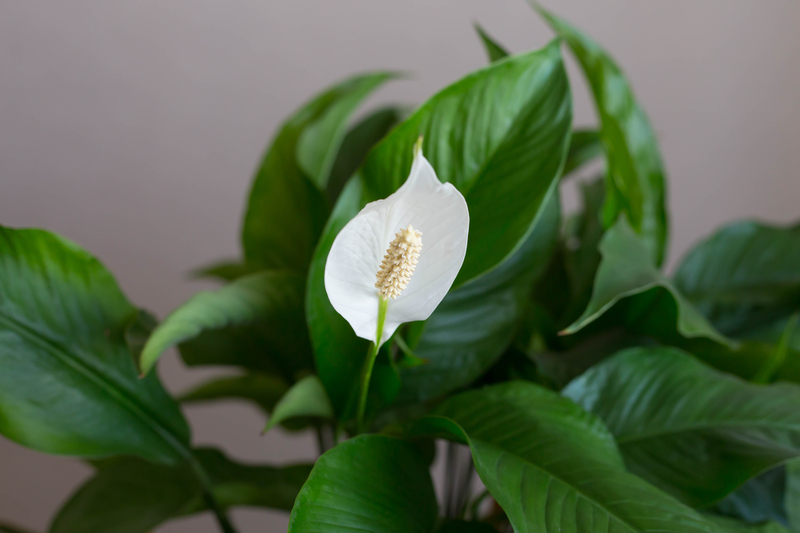Ensuring Your Garden Plants' Longevity Through Winter
Posted on 28/05/2025
Ensuring Your Garden Plants' Longevity Through Winter: The Ultimate Guide
As the crisp winds and shorter daylight hours of winter approach, garden enthusiasts often turn their thoughts toward one critical consideration: how to safeguard their cherished plants until spring's gentle return. After all, a garden's beauty isn't solely defined by summer's blooms, but by the care and foresight given to ensure each plant's survival and long-lasting vitality throughout the harshest season. In this comprehensive article, you'll find invaluable tips, insightful techniques, and expert advice on sustaining your garden's health and vibrancy year after year, especially during winter's chill.

Why Is Winter Protection Essential for Garden Plants?
Winter can be especially perilous for many plants, and gardeners often underestimate its impact. Freezing temperatures, frost, biting winds, and fluctuating weather patterns can stress or kill even the hardiest perennials and shrubs. Ensuring your garden plants' longevity through winter means more than mere survival--it ensures they emerge strong and ready to thrive come spring.
- Freezing damage: Sub-zero temperatures can rupture plant cells, leading to irreversible damage.
- Desiccation: Cold winds and dry air pull moisture from leaves and stems, increasing the risk of winter burn.
- Heaving: Freeze-thaw cycles push roots out of the ground, exposing them to cold and deprivation.
- Pest and disease risks: Some pathogens and pests may attack weakened plants during winter dormancy.
Understanding and anticipating these challenges is vital for safeguarding the health and longevity of your beloved plants during cold weather.
Assessing Your Garden: The First Step to Winter Plant Longevity
Not all plants are created equal when it comes to winter survival. Before taking protective measures, it's crucial to review your garden's inventory and identify what requires special attention.
Know Your Plant Hardiness Zones
Begin by determining your USDA plant hardiness zone or its equivalent in your region. Consult plant tags and labels for cold tolerance. Tender annuals, young perennials, newly planted shrubs, and less hardy species are most at risk and may need tailored protection.
- Tender annuals (e.g., impatiens, begonias): Best treated as seasonal; consider overwintering indoors if possible.
- Evergreens and broadleaf shrubs: Prone to desiccation and cold burn, especially in exposed spots.
- Roses, hydrangeas, and young trees: May benefit from extra insulation, mulching, or wrapping.
- Bulbs and herbaceous perennials: Often resilient, but may appreciate a protective mulch layer.
Essential Techniques for Protecting Garden Plants Through Winter
From strategic mulching to the art of plant wrapping, winterizing a garden is both science and craft. Below are time-tested methods--and innovative ideas--for boosting your garden plants' longevity in winter.
1. Apply Mulch Generously
- Mulch acts as insulation, moderating soil temperature and reducing moisture loss.
- Apply 2-4 inches of organic mulch--such as shredded leaves, straw, pine needles, or bark--around plants after the ground has frozen lightly. Avoid piling mulch against plant crowns to prevent rot.
- For sensitive perennials or bulbs, increase mulch thickness for added warmth.
2. Wrap and Shield Vulnerable Plants
- Use burlap, frost cloth, or garden fleece for evergreens, young trees, or delicate shrubs prone to windburn or sunscald. Create protective screens from stakes and fabric to block prevailing winds.
- Wrap the trunks of young trees (especially fruit trees) in tree wrap to thwart frost cracks and rodent damage.
- Consider "rose cones" or wire cages stuffed with leaves for tender roses or hydrangea varieties.
3. Manage Moisture Carefully
Water well before the first deep freeze; moist soil holds warmth better than dry soil. Hydrated plants are more resilient to winter stress. However, avoid late-season fertilizing, which can prompt tender new growth.
- Check drainage to prevent standing water, which can cause root rot in winter.
- Re-water during prolonged winter thaws if the ground isn't frozen.
4. Prevent Winter Heaving
- Newly planted perennials are most susceptible to freeze-thaw "heaving."
- Thick mulch, held in place by evergreen boughs or netting, helps stabilize temperature and minimizes soil upheaval.
5. Protect Container Plants
- Move portable pots and planters into sheltered locations: garages, sheds, or next to a heated wall.
- Wrap containers in insulating materials (bubble wrap, burlap, blankets), or "heel-in" potted plants in the ground and mulch heavily.
- Elevate pots to avoid waterlogging caused by frozen saucers or trays.
Advanced Strategies for Garden Plant Longevity in Winter
Monitor Microclimates
Every garden contains its own microclimates--spots that are warmer, colder, windier, or more sheltered than others. Utilize buildings, fences, or evergreen hedges as windbreaks. Group sensitive plants in such locations for added winter protection.
Cloches and Cold Frames
For vegetable beds or early-blooming flowers, try cloches (bell-shaped covers) or cold frames to shield against frost and extend the growing season. These add warmth and lessen temperature fluctuations.
Anti-Desiccant Sprays
Apply anti-desiccant sprays to broadleaf evergreens (e.g., rhododendrons, holly, boxwood) to reduce leaf moisture loss. These sprays form a water-permeable, protective barrier over leaf surfaces.
Deer and Rodent Deterrents
Winter hunger often drives wildlife into gardens. Use fences, netting, repellents, or protective tree guards to fend off browsing deer, rabbits, and rodents that can damage bark and roots when other food sources are scarce.
Overwintering Less Hardy Plants: Bringing Tender Plants Indoors
Some treasured plants, such as dahlias, cannas, or fuchsias, need to be lifted and stored indoors for winter.
- Carefully dig up bulbs, corms, or tubers after the first frost.
- Clean off soil and let them cure (dry) for several days in a sheltered, airy spot.
- Pack them in peat moss, sand, or vermiculite in a cool, dark place. Monitor regularly for signs of rot or dryness.
- For potted citrus, herbs, or succulents, bring them indoors before nighttime temperatures drop below their threshold.
Common Mistakes to Avoid When Protecting Plants Through Winter
- Applying mulch too early: Doing so before the ground has frozen can invite rodents to nest and chew on roots.
- Over-insulating: Smothering plants or using non-breathable covers can trap moisture and foster disease.
- Neglecting ventilation: If you use covers or cold frames, allow occasional airflow to prevent fungal build-up.
- Forgotten watering: Dormant plants may still dry out on sunny or windy winter days--check moisture levels periodically.
Preparing for Spring: Setting the Stage for Next Season's Health
Ensuring your garden plants' longevity through winter is not just about protection--it's also about preparation for vigorous spring growth.
- Inspect: As snow melts, remove winter wraps and mulch gradually.
- Prune: Trim away winter kill, dead stems, and branches to stimulate healthy new shoots.
- Feed: Top-dress with compost or well-rotted manure as soon as the soil is workable, fueling robust regrowth.
- Plan: Note which protection methods worked, and adjust for next winter's garden preparedness.

Frequently Asked Questions on Winterizing Garden Plants
How do I know which of my plants need winter protection?
Check plant tags and gardening books for cold hardiness. Newly planted, non-native, and tender species need the most care. Observe which plants suffered last winter and strengthen your protection accordingly.
Is it too late to protect garden plants if it's already snowed?
It's best to mulching and wrap before heavy snow, but you can still add protection during a thaw or cover exposed plants with burlap shields or evergreen boughs, which minimize freeze-thaw cycles.
Can I use plastic to cover plants in winter?
Avoid direct plastic contact with foliage; it traps moisture and can cause rot or freeze injury. Only use plastic as a temporary emergency measure, and remove it promptly after severe weather passes.
My container plants can't come indoors. What should I do?
Group containers in a protected nook, insulate (wrap) them, and mulch the surface. Try sinking pots into the earth and adding leaf mold or straw around their sides for natural insulation.
Conclusion: A Winter Well Spent Guarantees Spring's Bounty
Gardening is a year-round commitment, and the coldest months are when your devotion pays the greatest dividend. By employing strategic, science-backed winter protection methods and nurturing each plant's specific needs, you transform your garden into a haven able to withstand--not just survive--the challenges of winter.
From mulching to microclimate management, remembering to monitor for pests, and preparing for spring's return, your actions this winter lay the groundwork for a thriving, resilient garden. Take pride in ensuring your garden plants' longevity through winter, and you'll be rewarded with robust growth and beauty year after year.
Remember: Every choice counts. The more attentive and informed you are, the more stunning and durable your garden will become. Guard your paradise through the quiet season, and you'll be inspired anew come spring!
If you found this guide helpful, share it with your fellow gardeners and help others to safeguard their plants' longevity through the winter months--because a beautiful garden is worth every extra effort.
Latest Posts
Curating a Creative and Safe Garden for Your Kids
Vertical Gardening: Elevate Your Home's Aesthetics
Discover the Joy of Herb Gardening

